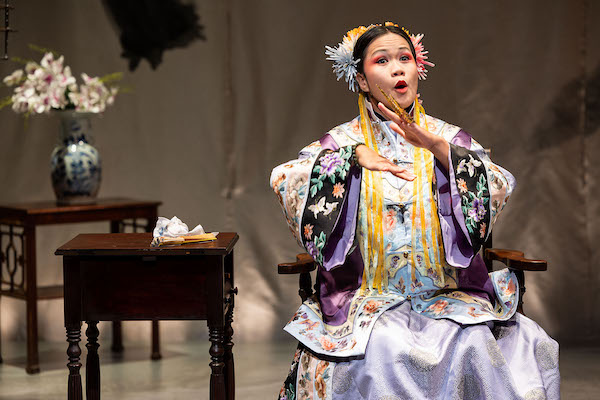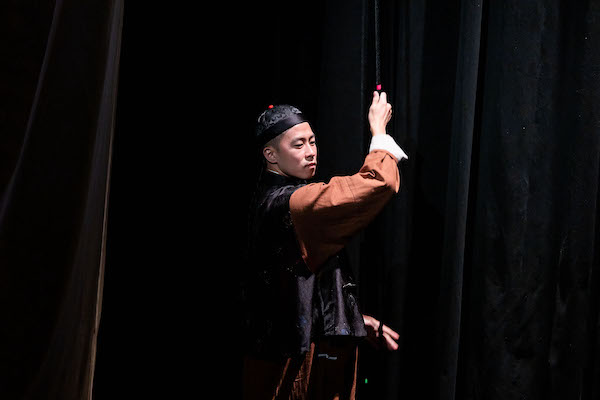Theater Review: “The Chinese Lady” — Woman in a Cage
By David Greenham
The artistic and design team at the Central Square Theater, in partnership with CHUANG Stage, have come up with an effective, thought-provoking 90-minute journey into a depressing aspect of the American story that was (and still is) rooted in xenophobia.
The Chinese Lady by Lloyd Suh. Directed by Sarah Shin. Presented by the Central Square Theater in partnership with CHUANG Stage, 450 Massachusetts Avenue, Cambridge, through December 11.

Sophorl Ngin in the CST production of The Chinese Lady. Photo: Nile Scott Studios
Not long after he signed the Chinese Exclusion Act on October 1, 1888, President Grover Cleveland spoke to a group of business leaders, insisting that “the experiment of blending the social habits and mutual race idiosyncrasies” of the American and Chinese cultures had been “in every sense unwise, impolitic, and injurious to both nations.” He concluded he was compelled to conclude that, in all fairness, “the Chinese are an undesirable people.” Playwright Lloyd Suh’s compelling and challenging drama The Chinese Lady speculates, both subtly and overtly, about whether our country’s attitudes have progressed all that much 130 years on.
“I know it is human nature to forget,” Afong Moy (Sophorl Ngin) tells us late in the play. By that time, she’s in her 60s and has forgotten much about her life before coming to America — the first Chinese female to come to this land. This story of a woman, who adopted the stage name of Afong Moy, is based on real events. In 1834 she arrived as a 14-year-old girl from Guangdong Province, China, sold by her father to American marketers/producers Nathaniel and Frederic Carne with the understanding that they would be featuring her in an exhibit in New York. This sideshow display was designed to build Western interest in the sale of Chinese silks, teas, and other commodities. Of particular interest was Afong Moy’s use of chopsticks and her tiny bound feet.
Bright-eyed and enthusiastic, Ngin’s Afong is an immediate success. “My entire life is a performance,” she says with a genuine smile. She twinkles as she explains the excruciating process of how her toes were repeatedly broken, folded beneath the soles of her feet, and bound to achieve their eventual four-inch span.
The script is set in New York’s Peale’s Museum, where she sits center stage in traditional costume and makeup. She talks to us through her translator, Atung (Jae Woo). “Atung is irrelevant,” she states matter-of-factly. He readily agrees: “You don’t need to know who I am or where I came from.”
Adults paid a quarter and children 10 cents to have a glimpse of Afong Moy at Peale’s. Atung’s task is to translate when needed, open and close the curtain, provide “the performer” with a tray of food at the appropriate time, and to remind her when it’s time to walk, which she does ceremoniously and slowly in a circle around the chair.
Afong initially believes that she has a two-year commitment to fulfill her father’s agreement with the promoters. She sees herself as an aesthetic ambassador of sorts, presenting Westerners with a sense of the beauty and elegance of her culture. Chopsticks are, of course, the preferred tool to aid in eating. “I’m ambivalent about the fork,” she says, declaring it “violent and easy.”
She even muses about providing this show-biz opportunity to others in China. Perhaps they should bring a 14-year-old Western girl to China to place on display? She believes that the Chinese would be quite interested in such Western traditions as women wearing corsets as well as the transatlantic slave trade.
As her stay continues beyond two years, and her father does not communicate with her, Afong suspects that her role as a diplomat might not be as pure as she thought. As Atung points out, America’s interest in Chinese culture might have little to do with admiration: “There’s a difference between sharing and taking.”
Still, the marketing continues, and a tour of many other American cities is planned, including a visit to Philadelphia to see the Liberty Bell and then to the White House in Washington, which will culminate with a visit with “Emperor Andrew Jackson.”

Jae Woo in CST’s production of The Chinese Lady. Photo: Nile Scott Studios
Afong is enamored with the Liberty Bell and told the official story of America’s founding. When she learns that some of what she heard was not exactly accurate, she admits that she prefers the myths — they are “better and more beautiful than the truth.”
The visit with Andrew Jackson provides one of the most disquieting moments in the play. Jackson, as enacted by Atung (Woo), is depicted as masterfully predatory, a boastful bully. He’s fetishistic about Afong’s feet and asks to touch them. “It’s at once disgusting and mesmerizing,” he says in Atung’s exaggerated Western drawl, “you are beautiful in your ugliness.” He believes that to be a compliment: “I’ve always enjoyed carnivals and freak shows.”
A visit to the Cincinnati Zoo shifts the play to a deeper level. Afong finally realizes what Atung has known all along: “If I’m in a cage, what kind of animal am I?,” she wonders.
Written and first performed in 2018, the concerns of The Chinese Lady have only become more relevant post-Covid, a pandemic that was colloquially dubbed “The Chinese Virus” by our president at the time, who was only too willing to encourage the rising wave of American prejudice. Increasing incidences, some violent, of anti-Asian hatred inevitably followed. The artistic and design team at the Central Square Theater, in partnership with CHUANG Stage, have come up with an effective, thought-provoking 90-minute journey into a depressing aspect of the American story that was (and still is) rooted in xenophobia.
Wisely, director Sarah Shin and her talented performers embrace the play’s increasing layers of sorrow and self-reflection. As more and more Chinese arrived during the course of the 19th century, Afong’s presence became less distinctive. Curiosity fades as popular perceptions about Chinese immigrants change. Afong tries to view the influx of her countrymen — often as manual, nonunionized workers — as a good thing. “We’ll see how that works out,” Atung replies flatly.
David Greenham is an adjunct lecturer of Drama at the University of Maine at Augusta, and is the executive director of the Maine Arts Commission. He has been a theater artist and arts administrator in Maine for more than 30 years.
Tagged: Central Square Theatre, CHUANG Stage, Lloyd Suh, Sarah Shin
